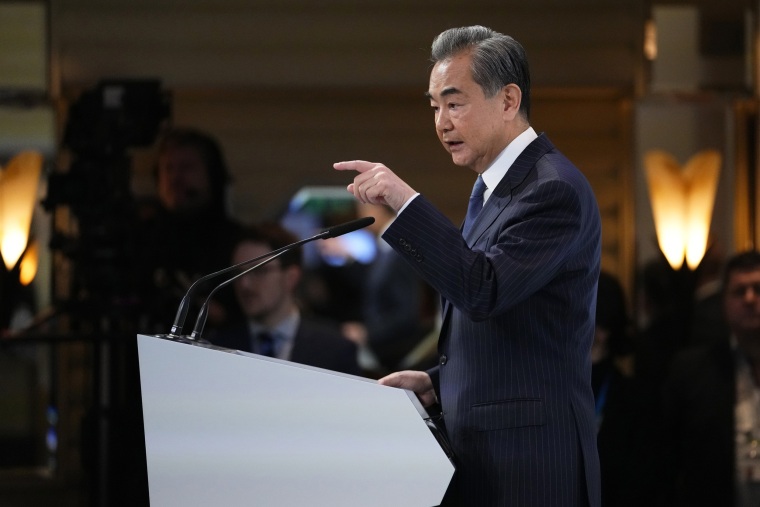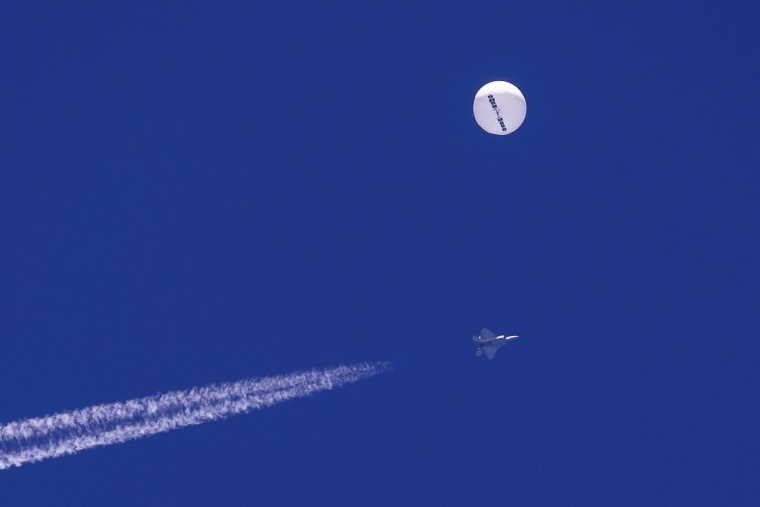MUNICH — China’s top diplomat on Saturday accused the U.S. of violating international norms with “hysterical” behavior, as a running spat over a suspected Chinese spy balloon bubbled to the fore at a global security conference in Munich.
The comments by Wang Yi further clouded the prospects of a meeting between Wang and U.S. Secretary of State Antony Blinken at the sidelines of the gathering. Asked by Reuters later whether he would meet Blinken, Wang smiled and declined comment.
Wang was speaking on the second day of the annual Munich Security Conference, which this year had so far been dominated by the global response to the Russian invasion of Ukraine as the war grinds towards its second year.

Vice President Kamala Harris later shot back, saying she was troubled that China had deepened its relationship with Russia since the Feb. 24 invasion and that Chinese support to Russia would undermine the rules-based international order.
The spat over the balloon — which flew over the U.S. and Canada before being shot down on President Joe Biden’s orders, hit already strained relations and at a time when the West is closely watching Beijing’s response to the Ukraine war.
“To have dispatched an advanced fighter jet to shoot down a balloon with a missile, such behavior is unbelievable, almost hysterical,” said Wang.
“There are so many balloons all over the world, and various countries have them, so is the United States going to shoot all of them down?” he said.
“We ask the U.S. to show its sincerity and correct its mistakes, face up and resolve this incident, which has damaged Sino-U.S. relations.”

The balloon spat had prompted Blinken to postpone a planned visit to Beijing. That Feb. 5-6 trip would have been the first by a U.S. secretary of state to China in five years and was seen by both sides as an opportunity to stabilize ties.
On its part, Washington has been hoping to put a “floor” under relations that hit a dangerous low in August with China’s reaction to a visit to Taiwan by then-U.S. House Speaker Nancy Pelosi.
Blinken is set to depart Munich on Sunday morning. A failure by the two diplomats to get together in a meeting could be seen as a further blow to the already strained relationship.
The West has been wary of China’s response to the war in Ukraine, with some warning that a Russian victory would colour China’s actions towards Taiwan. China has refrained from condemning the war or calling it an “invasion/”
“If (Russian President Vladimir) Putin thinks he can wait us out, he is badly mistaken,” Harris said in a panel at the gathering of top politicians, military officers and defense industry chiefs and experts at the Munich conference.
“Time is not on his side.”
Wang reiterated a call for dialogue and suggested European countries “think calmly” about how to end the war.
Wang also said there were “some forces that seemingly don’t want negotiations to succeed, or for the war to end soon,” without specifying to whom he was referring.
In an interview with Reuters, European Union chief Ursula von der Leyen said Beijing was not neutral regarding Ukraine. “China has taken sides very clearly has signed the unlimited friendship agreement with Russia. So it has taken a specific position,” she said.
Russia, which has cast its “special military operation” in Ukraine as an existential battle with an aggressive and arrogant West, on Friday accused the U.S. of inciting Ukraine to escalate the war by condoning attacks on Crimea.
The Munich conference began on Friday with Ukrainian President Volodymyr Zelenskyy urging Western allies to speed up sending modern weaponry in what he cast as a “David-vs.-Goliath” war for freedom against Russia.
Von der Leyen also outlined plans to speed up giving sorely needed munitions to Ukraine and replenish the bloc’s own stocks, while Poland signaled a willingness to send MiG fighter jets to Kyiv.
German Foreign Minister Annalena Baerbock also met Wang at the conference. Berlin has been reviewing its own ties to Beijing since the invasion, wary of its economy’s heavy reliance on the Chinese market.
“We discussed intensively yesterday what a just peace would look like,” Baerbock said. Blinken also held a bilateral meeting with Baerbock on Friday.
“Not that you reward the attacker, the aggressor, but that you stand up for international law and for those who were attacked. China is as a permanent member of the U.N. Security Council obligated to use its influence to secure world peace.”